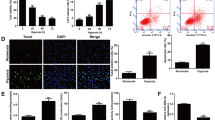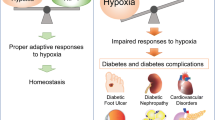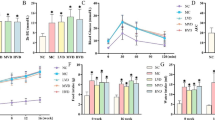Abstract
Hyperglycemia is a highly dangerous factor to various diseases, even resulting in death of people. Inflammation plays a key role in this process. The aim of this study was to explore the role of malignant fibrous histiocytoma amplified sequence 1 (MFHAS1) in high-glucose induced inflammation. Our research showed that high glucose stimulated the expression of MFHAS1, and overexpression of MFHAS1 can attenuate high-glucose induced inflammation in endothelial cells by decreasing the secretion of cytokines interleukin-1β (IL-1β), interleukin-1α (IL-1α), adhesion molecule intercellular adhesion molecule-1 (ICAM), interleukin-6 (IL-6), interleukin-8 (IL-8), and chemokine ligand 1 (CXCL-1). Furthermore, we found that MFHAS1 promoted the phosphorylation of Akt and the expression of heme oxygenase-1 (HO-1). Our results indicated that MFHAS1 deadened high-glucose induced inflammation by activating AKT/HO-1 pathway, suggesting that MFHAS1 may act as a new therapeutic target of diabetes mellitus.







Similar content being viewed by others
References
IDF Diabetes Atlas Sixth Edition, International Diabetes Federation 2013.
Chang, S.C., and W.V. Yang. 2016. Hyperglycemia, tumorigenesis, and chronic inflammation. Critical Reviews in Oncology/Hematology 108: 146–153.
Badawi, A., A. Klip, P. Haddad, D.E. Cole, B.G. Bailo, A. El-Sohemy, et al. 2010. Type 2 diabetes mellitus and inflammation: prospects for biomarkers of risk and nutritional intervention. Diabetes, Metabolic Syndrome and Obesity 3: 173–186.
Jung, U.J., and M.S. Choi. 2014. Obesity and its metabolic complications: the role of adipokines and the relationship between obesity, inflammation, insulin resistance, dyslipidemia and nonalcoholic fatty liver disease. International Journal of Molecular Sciences 15: 6184–6223.
Donath, M.Y., and S.E. Shoelson. 2011. Type 2 diabetes as an inflammatory disease. Nature Reviews. Immunology 11: 98–107.
Gothai, S., P. Ganesan, S.Y. Park, S. Fakurazi, D.K. Choi, and P. Arulselvan. 2016. Natural phyto-bioactive compounds for the treatment of type 2 diabetes: inflammation as a target. Nutrients 8.
Dihanich, S. 2012. MASL1: a neglected ROCO protein. Biochemical Society Transactions 40: 1090–1094.
Ng, A.C., J.M. Eisenberg, R.J. Heath, A. Huett, C.M. Robinson, G.J. Nau, et al. 2011. Human leucine-rich repeat proteins: a genome-wide bioinformatic categorization and functional analysis in innate immunity. Proceedings of the National Academy of Sciences of the United States of America 108 (Suppl 1): 4631–4638.
Kumkhaek, C., W. Aerbajinai, W. Liu, J. Zhu, N. Uchida, R. Kurlander, et al. 2013. MASL1 induces erythroid differentiation in human erythropoietin-dependent CD34+ cells through the Raf/MEK/ERK pathway. Blood 121: 3216–3227.
Xu, G., L. Feng, P. Song, F. Xu, A. Li, Y. Wang, et al. 2016. Isomeranzin suppresses inflammation by inhibiting M1 macrophage polarization through the NF-kappaB and ERK pathway. International Immunopharmacology 38: 175–185.
Chen, W., Y. Xu, J. Zhong, H. Wang, M. Weng, Q. Cheng, et al. 2016. MFHAS1 promotes colorectal cancer progress by regulating polarization of tumor-associated macrophages via STAT6 signaling pathway. Oncotarget 7: 78726–78735.
Zhong, J., Q.Q. Shi, M.M. Zhu, J. Shen, H.H. Wang, D. Ma, et al. 2015. MFHAS1 is associated with sepsis and stimulates TLR2/NF-kappaB signaling pathway following negative regulation. PLoS One 10: e0143662.
Zhong, J., H. Wang, W. Chen, Z. Sun, J. Chen, Y. Xu, et al. 2017. Ubiquitylation of MFHAS1 by the ubiquitin ligase praja2 promotes M1 macrophage polarization by activating JNK and p38 pathways. Cell Death & Disease 8: e2763.
Zhao, X.D., Y.H. Qin, J.X. Ma, W. Dang, M. Wang, X. Zhang, et al. 2013. Influence of intensive insulin therapy on vascular endothelial growth factor in patients with severe trauma. Journal of Huazhong University of Science and Technology. Medical Sciences 33: 107–110.
Wong, T.H., H.A. Chen, R.J. Gau, J.H. Yen, and J.L. Suen. 2016. Heme oxygenase-1-expressing dendritic cells promote Foxp3+ regulatory T cell differentiation and induce less severe airway inflammation in murine models. PLoS One 11: e0168919.
Mei, X., H.X. Wang, J.S. Li, X.H. Liu, X.F. Lu, Y. Li, et al. 2017. Dusuqing granules (DSQ) suppress inflammation in Klebsiella pneumonia rat via NF-kappaB/MAPK signaling. BMC Complementary and Alternative Medicine 17: 216.
Tang, F., Y. Wang, B.A. Hemmings, C. Ruegg, and G. Xue. 2017. PKB/Akt-dependent regulation of inflammation in cancer. Seminars in Cancer Biology.
Calle, M.C., and M.L. Fernandez. 2012. Inflammation and type 2 diabetes. Diabetes & Metabolism 38: 183–191.
Tagawa, H., S. Karnan, Y. Kasugai, S. Tuzuki, R. Suzuki, Y. Hosokawa, et al. 2004. MASL1, a candidate oncogene found in amplification at 8p23.1, is translocated in immunoblastic B-cell lymphoma cell line OCI-LY8. Oncogene 23: 2576–2581.
Zhao, M.X., B. Zhou, L. Ling, X.Q. Xiong, F. Zhang, Q. Chen, et al. 2017. Salusin-beta contributes to oxidative stress and inflammation in diabetic cardiomyopathy. Cell Death & Disease 8: e2690.
Eriksson, L., and T. Nystrom. 2015. Antidiabetic agents and endothelial dysfunction—beyond glucose control. Basic & Clinical Pharmacology & Toxicology 117: 15–25.
Pradhan, A.D., J.E. Manson, N. Rifai, J.E. Buring, and P.M. Ridker. 2001. C-reactive protein, interleukin 6, and risk of developing type 2 diabetes mellitus. Journal of the American Medical Association 286: 327–334.
Maines, M.D. 1988. Heme oxygenase: function, multiplicity, regulatory mechanisms, and clinical applications. The FASEB Journal 2: 2557–2568.
Yu, W., X. Zhang, H. Wu, Q. Zhou, Z. Wang, R. Liu, et al. 2017, 2017. HO-1 is essential for tetrahydroxystilbene glucoside mediated mitochondrial biogenesis and anti-inflammation process in LPS-treated RAW264.7 macrophages. Oxidative Medicine and Cellular Longevity: 1818575.
Ryter, S.W., J. Alam, and A.M. Choi. 2006. Heme oxygenase-1/carbon monoxide: from basic science to therapeutic applications. Physiological Reviews 86: 583–650.
Steinberg, G.R., and J.D. Schertzer. 2014. AMPK promotes macrophage fatty acid oxidative metabolism to mitigate inflammation: implications for diabetes and cardiovascular disease. Immunology and Cell Biology 92: 340–345.
Xu, L., J. Zhu, W. Yin, and X. Ding. 2015. Astaxanthin improves cognitive deficits from oxidative stress, nitric oxide synthase and inflammation through upregulation of PI3K/Akt in diabetes rat. International Journal of Clinical and Experimental Pathology 8: 6083–6094.
Rogers, L.J., A.G. Basnakian, M.S. Orloff, B. Ning, A. Yao-Borengasser, V. Raj, et al. 2016. 2-Amino-1-methyl-6-phenylimidazo(4,5-b) pyridine (PhIP) induces gene expression changes in JAK/STAT and MAPK pathways related to inflammation, diabetes and cancer. Nutrition & Metabolism (London) 13: 54.
Ku, H.C., S.Y. Lee, K.C. Yang, Y.H. Kuo, and M.J. Su. 2016. Modification of caffeic acid with pyrrolidine enhances antioxidant ability by activating AKT/HO-1 pathway in heart. PLoS One 11: e0148545.
Acknowledgements
This work was supported by the National Natural Science Foundation of China (No. 81372101).
Author information
Authors and Affiliations
Corresponding authors
Ethics declarations
Conflict of Interest
The authors declare that they have no conflict of interest.
Additional information
Hui-hui Wang and Peng-fei Sun contributed equally to this work.
Electronic Supplementary Material
Rights and permissions
About this article
Cite this article
Wang, Hh., Sun, Pf., Chen, Wk. et al. High Glucose Stimulates Expression of MFHAS1 to Mitigate Inflammation via Akt/HO-1 Pathway in Human Umbilical Vein Endothelial Cells. Inflammation 41, 400–408 (2018). https://doi.org/10.1007/s10753-017-0696-0
Published:
Issue Date:
DOI: https://doi.org/10.1007/s10753-017-0696-0




